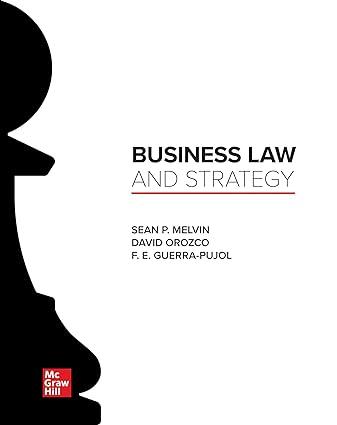Thomas Strickland was an assistant vice president and underwriter at General Electric Capital Corporation (GE Capital). In
Question:
Thomas Strickland was an assistant vice president and underwriter at General Electric Capital Corporation (“GE Capital”). In 2001, Allied Capital Corporation (“Allied”) began negotiations with GE Capital concerning financing of Allied’s planned acquisition of SunSource, Inc. (“SunSource”), a publicly traded company that distributed industrial products. Strickland was assigned to perform due diligence on SunSource as part of the GE Capital team working on the SunSource-Allied financing proposal. His tasks included analyzing SunSource’s financial performance and other due diligence tasks. In the course of his work, Strickland learned nonpublic information about SunSource, including the basic fact that SunSource was about to be acquired by Allied. Each page of the transaction’s deal book, which Strickland received, was marked “Extremely Confidential.” Strickland was also bound to GE Capital’s employee code of conduct, which required employees to “safeguard company property [including] confidential information about an upcoming deal.” GE Capital also maintained a transaction-restricted list, containing the companies about which GE Capital and its employees possessed material, nonpublic information and which were, therefore, off-limits for securities trading.
Peter Black, a friend of Strickland’s from college, worked as an analyst at Wynnefield Capital, Inc. (“Wynnefield”), which managed a group of hedge funds. In the course of his due diligence research, Strickland learned from publicly available sources that Wynnefield was a large holder of SunSource stock. After Strickland completed the Allied-SunSource acquisition due diligence, he and Black had a conversation about SunSource and, according to the SEC, Strickland revealed material, nonpublic information by telling Black that Allied was about to acquire SunSource. Immediately after Black’s conversation with Strickland, Black relayed the information he had learned to his boss at Wynnefield, Nelson Obus. On June 8, 2001, two weeks after the conversation between Strickland and Black, Wynnefield purchased a total block of 287,200 shares, about 5 percent of SunSource’s outstanding common stock. On June 11, 2001, Wynnefield sold 6,000 shares of SunSource. As a result, Wynnefield’s June 8, 2001, purchase of SunSource stock nearly doubled in value, producing a paper profit to Wynnefield of over $1.3 million.
CASE QUESTIONS
1. What kind of insider trading occurred here?
2. Did Strickland violate a duty? If yes, to whom? Why or why not?
Step by Step Answer:

Business Law And Strategy
ISBN: 9780077614683
1st Edition
Authors: Sean Melvin, David Orozco, F E Guerra Pujol





